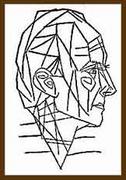Paul Eluard
- �ܺ� 2024ǯ1��6�� 01:00����
-
P.Eluard
Paul Eluard (born Eugene Grindel)
(1895 - 1952)
French Poet
French poet, born in Saint-Denis in 1895. Struck by the First World War, Eluard became a pacifist militant (Poes pour la Paix 1918). In 1920, he met Tzara, Breton, and Aragon, and participated in the Dada movement, prior to leaving on a long trip around the world. Upon his return he re-joined the surrealists, over whom he had a profound influence, all the while maintaining a personal approach to literature (he remained wary of automatic writing, for example). He met and married Maria Benz (Nusch Eluard), which became one of the most important events in his life as she was the inspiration for three collections : Capitale de la Douleur (1926), L'Amour, la Poie (1929), and La Veritmmiate (1932), in which Eluard celebrated impassioned love with subtlety and vigor. Eluard was barred from the communist party after a falling-out between himself and Aragon. He then pursued work on poetry that was accessible to all, in spite of being rich in images and innuendo (Les Yeux Fertiles
1936).
�������ᥲ����
�͵����ߥ�˥ƥ����
- 1��
- ��
- 170591��
- 2��
- ���� ���åƥޥ��
- 37144��
- 3��
- �����������������
- 2503��
���ä��Ȥ��ˤ�












